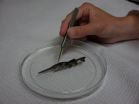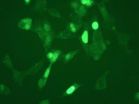(Press-News.org) CAMDEN – A top national award for promising research scientists has been presented to Princeton resident Nir Yakoby, an assistant professor of biology at Rutgers University–Camden.
Yakoby has received a prestigious CAREER Award from the National Science Foundation. The five-year, $686,544 award, which is reviewed and renewed annually based on the scientific progress of the project, supports the Rutgers–Camden researcher's project "Dynamics and Diversity of Bone Morphogenetic Protein Signaling in Epithelial Cells."
The grant will allow Yakoby and his research lab team to study the processes that occur during the time that cells decide what to become. Rutgers–Camden student researchers will join Yakoby in using the fruit fly Drosophila as an experimental system to study how very similar layers of cells produce different numbers of tubes. Through this work, the Rutgers–Camden researcher will seek to understand how changes in the bone morphogenetic protein (BMP) signal create different morphologies.
In explaining his research, Yakoby posits the following questions: "Why do we have two arms and two legs and not three of each? Why do we have five fingers and not six?" The Rutgers–Camden researcher seeks to find those answers by examining the signals and processes that advise cells as they form organs.
"These questions are particularly intriguing since the cells in the human body all contain the same genetic information. However, the clear cells in the eyes' corneas are obviously very different from the cells that secrete insulin in the pancreas," notes Yakoby.
A major goal of the NSF CAREER Award is to integrate academic teaching with research in the lab. Rutgers–Camden students will participate in this research.
In the Yakoby Lab, Rutgers–Camden students use the fruit fly Drosophila as an experimental system to study how a layer of cells in the fly ovaries form an eggshell. The eggshell protects the developing embryo from the dry environment while allowing for respiration through tube-like snorkels called dorsal appendages (DAs). Just as animals have different numbers of fingers, the numbers of the eggshells' respiratory tubes differ among Drosophila species. Thus, the eggshell provides a unique opportunity to study how very similar layers of cells produce different numbers of tubes.
In humans, a signal named the bone morphogenetic protein (BMP) is necessary to define the development of fingers. The same signal controls the formation of the DAs on the Drosophila eggshell. Through his CAREER Award, Yakoby proposes to study how changes in the BMP signal allow for the formation of different numbers of DAs. Since the BMP signal is highly conserved between Drosophila and humans, understanding how changes in this signal create different morphologies will help to understand tissue pathologies and developmental defects which are associated with mal-regulation of the BMP signal.
Yakoby's research has appeared in such scientific publications as the prestigious journal Developmental Cell. He teaches courses in genetics to undergraduate and graduate students at Rutgers–Camden, where he is an active member of the Center for Computational and Integrative Biology. He advises two PhD students in the Rutgers–Camden computational biology program
Yakoby earned his bachelor's and doctoral degrees from Hebrew University in Israel, and conducted post-doctoral research at the Lewis-Sigler Institute for Integrative Genomics at Princeton University.
### END
Rutgers-Camden genetics researcher receives NSF CAREER Award
2012-08-07
ELSE PRESS RELEASES FROM THIS DATE:
Paddlefish's doubled genome may question theories on limb evolution
2012-08-07
SAN FRANCISCO, August 7, 2012 -- The American paddlefish -- known for its bizarre, protruding snout and eggs harvested for caviar -- duplicated its entire genome about 42 million years ago, according to a new study published in the journal Genome Biology and Evolution. This finding may add a new twist to the way scientists study how fins evolved into limbs since the paddlefish is often used as a proxy for a more representative ancestor shared by humans and fishes.
"We found that paddlefish have had their own genome duplication," said Karen Crow, assistant professor of ...
Corticosteroids not effective for treating acute sinusitis
2012-08-07
Corticosteroids, frequently prescribed to alleviate acute sinusitis, show no clinical benefit in treating the condition, according to a randomized controlled trial published in CMAJ (Canadian Medical Association Journal) (pre-embargo link only) http://www.cmaj.ca/site/press/cmaj.120430.pdf.
The common cold is the main cause of acute sinusitis, which is characterized by inflammation of the nasal cavities, blocked nasal passages and sometimes headaches and facial pain. Allergies and bacteria can also cause the condition, which is uncomfortable and difficult to treat. Antibiotics ...
Higgs transition of north and south poles of electrons in a magnet
2012-08-07
Minimal evidence of a Higgs transition 1 of north and south poles of electron spins was observed in a magnet Yb2Ti2O7 at the absolute temperature 2 0.21 K. A fractionalization of these monopoles from electron spins was observed on cooling to 0.3 K. On further cooling below 0.21 K, the material showed the ferromagnetism to be understood as a superconductivity of monopoles. The work is reported in an online science journal "Nature Communications" in UK on August 7, by an international collaboration team of Dr. Shigeki Onoda (Condensed Matter Theory Lab., RIKEN Advanced Science ...
GW Researcher finds depressive symptoms and suicidal thoughts in former finasteride users
2012-08-07
WASHINGTON — (Aug 7, 2012) New research, to be published in the Journal of Clinical Psychiatry, finds that men who developed persistent sexual side effects while on finasteride (Propecia), a drug commonly used for male pattern hair loss, have a high prevalence of depressive symptoms and suicidal thoughts. The study, titled "Depressive Symptoms and Suicidal Thoughts Among Former Users of Finasteride With Persistent Sexual Side Effects," was authored by Michael S. Irwig, M.D., an assistant professor of medicine in the Division of Endocrinology at the George Washington University ...
Advance in X-ray imaging shines light on nanomaterials
2012-08-07
A new advance in X-ray imaging has revealed the dramatic three-dimensional shape of gold nanocrystals, and is likely to shine a light on the structure of other nano-scale materials.
Described today in Nature Communications, the new technique improves the quality of nanomaterial images, made using X-ray diffraction, by accurately correcting distortions in the X-ray light.
Dr Jesse Clark, lead author of the study from the London Centre for Nanotechnology said: "With nanomaterials playing an increasingly important role in many applications, there is a real need to be ...
Food hypersensitivity and otolaryngologic conditions in young children
2012-08-07
Alexandria, VA — Cow's milk protein allergy (CMPA), although difficult to diagnose in young children, shows a causative relationship to otolaryngic symptoms. A new study in the August journal, Otolaryngology–Head and Neck Surgery suggests an elimination diet may help manage such conditions in children under two and reduce the need for more serious upper airway tests and interventions.
"Early recognition of CMPA in association with upper airway disease may subsequently reduce the economic burden and number of procedures required in affected infants," report the authors.
The ...
Why do infants get sick so often?
2012-08-07
ANN ARBOR, Mich. – Researchers at the University of Michigan Health System are helping to quell parents' worry about why infants seem to get sick so often.
It's been believed that, like walking and talking, fighting viral infections is something children will develop when they get older. But a U-M study suggests the natural ability to fight infection is there early on.
Scientists learned key cell signals inhibit the growth of essential immune cells early in life. Blocking this signaling could lead to improving an infant's response to infection, according to the study ...
Treatment target for diabetes, Wolfram syndrome
2012-08-07
AUDIO:
Wolfram syndrome is a rare disorder that causes insulin-dependent diabetes, kidney problems and vision and hearing loss, among other things. Now researchers at Washington University School of Medicine in St....
Click here for more information.
Inflammation and cell stress play important roles in the death of insulin-secreting cells and are major factors in diabetes. Cell stress also plays a role in Wolfram syndrome, a rare, genetic disorder that afflicts children with ...
Frequent traveller: Dysentery-causing bacteria spreading from Europe to Australia
2012-08-07
Researchers have found that a strain of dysentery-causing bacterium that originated from Europe centuries ago is spreading rapidly to Australia and some developing countries
First author, Dr Kathryn Holt from the University of Melbourne said that the bacterium strain Shingella. sonnei is easily transmitted due to the high levels of drug resistance in developed countries.
"Contrary to standard guidelines, drug treatment and better sanitation alone will not be sufficient for controlling this strain. Vaccine development will be crucial." she said
Dr Holt has pioneered ...
Using wastewater as fertilizer
2012-08-07
Phosphorus is a vital element not only for plants but also for all living organisms. In recent times, however, farmers have been faced with a growing shortage of this essential mineral, and the price of phosphate-based fertilizers has been steadily increasing. It is therefore high time to start looking for alternatives. This is not an easy task, because phosphorus cannot be replaced by any other substance. But researchers at the Fraunhofer Institute for Interfacial Engineering and Biotechnology IGB in Stuttgart have found a solution that makes use of locally available resources ...



